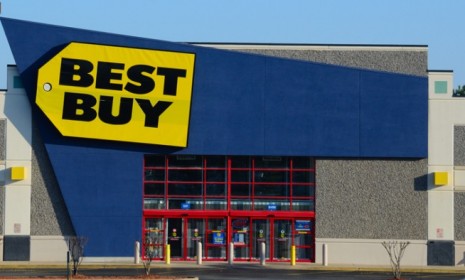Is Best Buy's big-box business model dead?
The rise of online shopping is taking a toll on the electronics chain — and casting doubt on the future of sprawling, warehouse-like stores

A free daily email with the biggest news stories of the day – and the best features from TheWeek.com
You are now subscribed
Your newsletter sign-up was successful
It may only be a matter of time before those familiar blue-and-yellow behemoths disappear from America's suburban shopping landscape. Best Buy is closing 50 of its signature "big box" electronics stores amidst falling profits and the implacable rise of Amazon and other online retailers. Like other brick-and-mortar chains that have run aground in recent years (think Circuit City and Borders), Best Buy is struggling to adapt to the e-commerce economy, with more customers turning to the internet to buy their HD TVs and iPods. Do Best Buy's problems herald the demise of the big-box model?
Best Buy is in big trouble: "The era of big-box retail dominance is coming to an end," says Bloomberg Businessweek. While the sluggish economy is partly to blame for Best Buy's falling profits, the electronics giant's model has deep structural flaws that don't bode well for the future. Best Buy has to pay for real estate and sales staff, while Amazon does not, allowing the online retailer to sell the same products at a steep discount. "After 50 years of putting mom and pops out of business, big-box retail is having a mid-life crisis."
"Best Buy closings signal end of big-box retail"
The Week
Escape your echo chamber. Get the facts behind the news, plus analysis from multiple perspectives.

Sign up for The Week's Free Newsletters
From our morning news briefing to a weekly Good News Newsletter, get the best of The Week delivered directly to your inbox.
From our morning news briefing to a weekly Good News Newsletter, get the best of The Week delivered directly to your inbox.
It all depends on how Best Buy adjusts: Best Buy isn't just closing 50 stores, says Stacey Higginbotham at GigaOm. At many of its remaining locations, Best Buy is boosting worker training, increasing opportunities for customers to actually try out devices, and refocusing on smaller gadgets like mobile phones. That shift in strategy could save Best Buy. After all, Apple's stores are wildly popular, and show that "brick-and-mortar retail can succeed." If Best Buy can mimic Apple's model of having knowledgeable salespeople and streamlined interiors, its stores could once again become desirable destinations.
"Best Buy, the end of big box, and the future of retail"
But Best Buy can never be Apple: Best Buy is hoping that its "Knowledge Desk" and "Geek Squad" is the answer to Apple's "Genius Bar," says Beth Carter at Wired. But the difference is that Best Buy "is just a middleman, selling things other companies make," while "nobody else really services" Apple's products. Apple is a tough act to follow, and Best Buy is in danger of becoming a "showroom for shoppers" who will test products, scan the bar code into their phones, and then order the gadget at a discount from an online retailer.
"Best Buy, the big-box model, and the trouble with real estate"
A free daily email with the biggest news stories of the day – and the best features from TheWeek.com
-
 Buddhist monks’ US walk for peace
Buddhist monks’ US walk for peaceUnder the Radar Crowds have turned out on the roads from California to Washington and ‘millions are finding hope in their journey’
-
 American universities are losing ground to their foreign counterparts
American universities are losing ground to their foreign counterpartsThe Explainer While Harvard is still near the top, other colleges have slipped
-
 How to navigate dating apps to find ‘the one’
How to navigate dating apps to find ‘the one’The Week Recommends Put an end to endless swiping and make real romantic connections